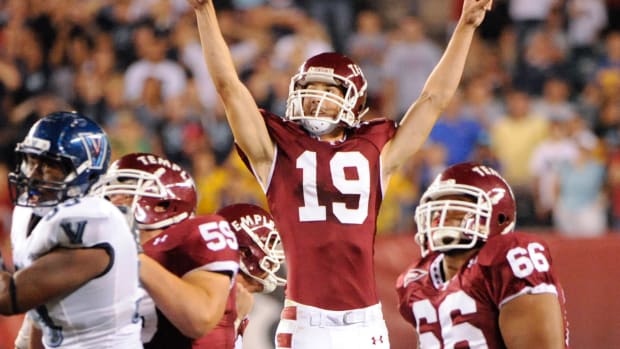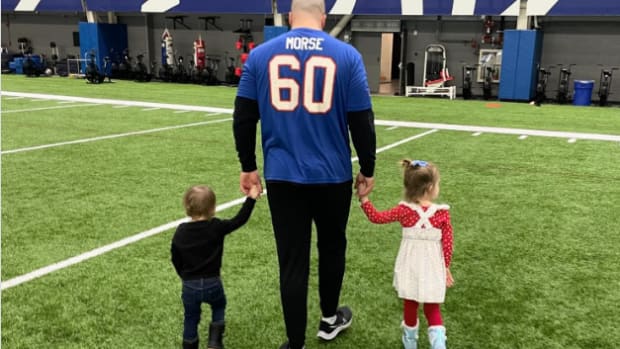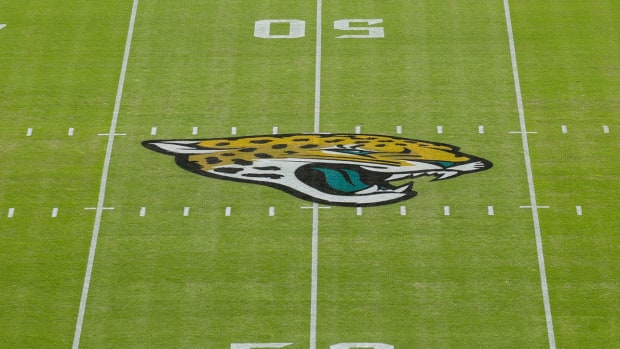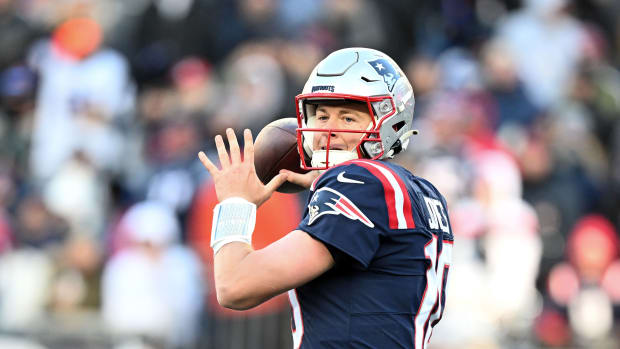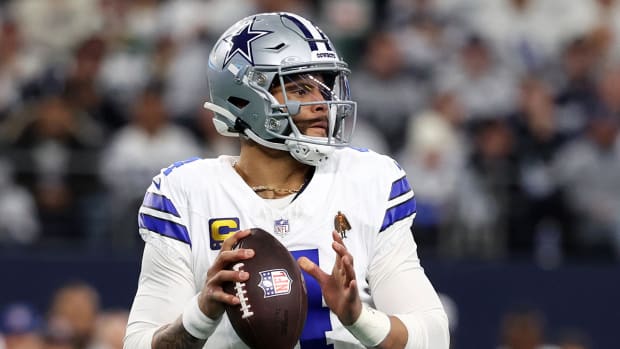What History Says About the Jaguars' Chances to Change the Franchise With Trevor Lawrence
For the first time in franchise history, the Jacksonville Jaguars will own the No. 1 overall pick in the upcoming NFL Draft. It’s a heady responsibility, one that can be seen as a simple decision—pick the best overall player available—but which teams can at times overthink (unless of course, Vontae Mack is available, in which case he’s clearly the best choice).
With the Jaguars essentially now on the clock, the countdown has begun to a new era in Jacksonville.
The best player available is Clemson Tigers quarterback Trevor Lawrence. Unless something drastically changes between now and April, there’s no reason the Jaguars shouldn’t take Lawrence. But is there anything to overthink here?

Clemson quarterback Trevor Lawrence (16) runs the ball for a first down during the third quarter against Pittsburgh at Memorial Stadium. Mandatory Credit: Ken Ruinard-USA TODAY Sports
When it comes to Lawrence, there is nothing to overthink. He’s a great prospect who has looked tailor-made for the NFL since he was a high school quarterback in small-town Cartersville, Georgia. Everything he’s done in college—including winning a National Championship as a freshman—has set him up for this moment and this selection.
So any question in the selection doesn’t come from Lawrence but more so the pick itself. Just how often does having the No. 1 overall pick in the NFL Draft work out for teams? Is there better success searching for diamonds in the rough like Tom Brady in the sixth round, and taking a lineman first overall, something that has happened 22 times in the history of the draft?
We dug through the research so you didn’t have to and here’s what history tells us about taking a quarterback with the first overall pick in the draft.
The draft has gone on for 85 years, meaning there have been 85 first overall picks. Quarterbacks have been chosen first 33 times, the most of any position. In the 15 year span from 1998-2012, quarterbacks were the first pick 13 times. The past six drafts, beginning in 2015, Commissioner Roger Goodell has called a quarterback’s name first five times. Defensive end Myles Garrett is the only non-quarterback to be chosen since 2015.
The longest streak between quarterbacks selected No. 1 overall was an eight-year span from 1975 to 1983, during which time players like Lee Roy Selmon, Earl Campbell, and Billy Sims were all chosen.
The closest one team has ever picked a quarterback first overall to itself was in 1944 and 1946 when the Boston Yanks selected Notre Dame quarterbacks Angelo Bertelli and Frank Dancewicz in the span of two years. Granted, Bertelli never made it to the field for the Yanks; after being drafted, he was sent to the battlefield in World War II. However, after returning from war, Bertelli did play three years with two other franchises.
Of the 33 first overall passers, 18 have been elected to Pro Bowls, three have been awarded Rookie Of the Year (Sam Bradford, Cam Newton, and Kyler Murray), three are already in the Hall of Fame (Terry Bradshaw, John Elway, and Troy Aikman) and four have been named NFL MVP at least once in their career (Bradshaw, Elway, Peyton Manning, and Newton).

Kyler Murray was named ROY and selected to a Pro Bowl all within two years of being drafted No. 1 overall. Mandatory Credit: Christopher Hanewinckel-USA TODAY Sports
Of course, as nice as those accolades are, they are individual awards. A quarterback brought in to change a franchise is expected to, well, change the franchise.
Pro Bowl seasons and Hall of Famers and MVPs are bragging points—but they don’t always translate to wins and losses. To really determine how drafting a quarterback No. 1 overall has changed a franchise, we have to look at the playoffs.
It should be noted, some of the playoff statistics and distinctions should be taken with a grain of salt. While the NFL has held a Championship game—and thus a postseason—since 1933, the “playoff" itself only consisted of the single championship game from 1933-1966. The playoffs were expanded to four teams in 1967, eight teams in 1970 after merging with the AFL, ten teams in 1978, 12 in 1990, and then 14 for the 2020 season albeit the latest change was due in large part to the pandemic putting more strain on teams in the regular season.
Five teams either never made it to the NFL Championship during that structure or had never made it at all before drafting their quarterback, albeit all of those occurrences came 1975 or prior.
Examining the 28 teams remaining who elected to use their first overall pick on a passer, the average length of time between not making a playoff and drafting a quarterback at No. 1 was seven years. The Jaguars will have gone three seasons by the time they are on the clock for, again presumably, Lawrence.
Of the 33 quarterbacks chosen first overall, 19 have reached the playoffs at least once in their career. Since the 1967 playoff expansion, 18 of the 24 first overall picks have made the postseason.
Some teams have gone extended periods of time without a playoff, hoping a generational talent under center will change that fact. Three of the last five quarterbacks who heard their name first were all brought in to end those droughts.
Jameis Winston was drafted by the Tampa Bay Buccaneers in 2015 when that organization was going on almost a decade of no playoff appearances. Winston, infamously, didn’t deliver and didn't get a second deal in Tampa. He signed with the New Orleans Saints the past offseason and now Tom Brady is taking the Bucs to their first postseason since 2007.
Jared Goff joined Los Angeles when the franchise hadn’t been in the playoffs since they were called the St. Louis Rams in 2004. Goff took the Rams to the playoffs his second season (2017) and to a Super Bowl appearance the following season.

Jared Goff led the Rams to a NFC Title and Super Bowl appearance within three years of being selected No. 1 overall. Mandatory Credit: Mark J. Rebilas-USA TODAY Sports
Baker Mayfield is in his third season and if the Browns miss the playoffs this year, it will be for the 20th straight year. However, they are still in the hunt, looking to reach the postseason for the first time since 2002 when another No. 1 pick—Tim Couch—took the Browns to the Wild Card round but lost.
Of course, there have been busts -- most of them in earlier years. Scouting and extensive interviews that have become a part of the process have helped teams with deeper evaluations in more recent drafts.
There was Bobby Garret, the No. 1 overall pick by the Cleveland Browns in the 1954 draft, only to be immediately traded to the Green Bay Packers and cut after nine games, both a product of teams realizing he had a stutter and couldn’t call plays in the huddle. Randy Duncan in 1959 didn’t want to play for the pre-Vince Lombardi Packers and instead fled north to play for the Canadian league.
Terry Baker was selected by the Rams in 1963, hoping to end an eight-year playoff drought. But he was considered the first real draft bust, lasting three years in the league. The Bucs took Miami’s Vinny Testaverde in 1987, and he actually became a journeyman, putting together 21 years in the NFL with seven teams, en route to what still stands as an NFL record worst 123 losses for a quarterback.
LSU’s JaMarcus Russell held out for a better contract after being drafted first overall to the Oakland Raiders in 2007 and after what was considered a headache and nothing more, the club cut him after only three seasons. As such, Russell took the banner from Terry Baker as the worst No. 1 overall quarterback draft bust.
Andrew Luck picked up the baton from Peyton Manning after the latter went to the Denver Bronco’s, going 4-4 in playoffs and making four Pro Bowls before infamously retiring early before the 2019 season.
Then there are the weird ones. 2002 No. 1 pick David Carr won a Super Bowl ring, but as a backup. John Elway famously refused to play for the Baltimore Colts, threatening to play baseball if he was drafted to the Colts. When the Colts drafted him anyway, he reiterated to reporters in a press conference that he was going to play baseball. Not wanting to waste the pick, the Baltimore Colts front office had already made plans for a post-draft trade and a short time later, Elway was traded to the Denver Bronco’s where he spent his entire career.
Leading to the 2004 NFL Draft, Eli Manning and his father Archie made the same demand, stating Manning would not play for the San Diego Chargers, who owned the first pick that season.
As such, the Chargers and Giants arranged a deal before the draft, in which San Diego still drafted Manning first overall, the Giants took Philip Rivers, and then the two simply swapped. Rivers spent 16 seasons with the Chargers and Manning his entire 16-year career with the Giants, making up two-thirds of one of the greatest QB classes of all time.
Both Elway and E. Manning won multiple Super Bowls with their eventual teams. In all, there are 10 quarterbacks taken No. 1 overall that have won a Super Bowl, with six of those 10 winning multiple Lombardi trophies. That means 30% of No. 1 quarterback shave won their team a Super Bowl. None that have been chosen since Manning can make that claim, although eight of those 11 (including 2020 pick Joe Burrow) are still in the league and fighting for the ring.
That last stat speaks to the longevity of many first overall picks at quarterback. If we take out Bobby Garret and his nine games and Duncan who went to Canada as well as the eight still currently playing, the average lifespan of a quarterback taken first overall is 11 years. Of those still competing, Alex Smith has been in the league the longest, first drafted in 2005. Matthew Stafford, taken in 2009 by the Detroit Lions is the second longest-tenured No. 1 pick.
Then there is arguably the greatest No. 1 overall quarterback pick of all time: Terry Bradshaw.
When the Pittsburgh Steelers selected the gunslinger from Louisiana Tech, they had not been to a playoff game in 23 seasons, the longest such gap for a team before picking a QB first overall. Bradshaw spent his entire career in Pittsburgh, 14 seasons total. During that time, he went 14-5 in the playoffs, won four Super Bowls, was named Super Bowl MVP twice, NFL MVP once, and elected to three Pro Bowls. It’s no surprise he is a member of the NFL Hall of Fame.
As with anything in life and sports, there is risk. Maybe Trevor Lawrence will hold out for a different team or go to a different league, although three times out of 33 selections don’t make that likely. Maybe he’ll hold out for a better contract—although, again, with the Jaguars' current cap space, that shouldn’t be an issue. Maybe he’ll be a bust and sign with New Orleans in four seasons.
But maybe he’ll spend his entire career in Jacksonville, something nine former No. 1 picks (that have spent five or more years in the league) all have done. That means 31% of those selections spent their whole career in one city, or even win a Super Bowl with a team before moving on to another, a la Peyton Manning.
Maybe Trevor Lawrence will turn his team into perennial contenders, competing for postseason glory. Maybe he’ll become a household name, create a legacy and change a franchise.
If history shows us anything, it’s that when a generational talent is available, the risk is outweighed by the reward and more often than not, a franchise can be changed forever.
